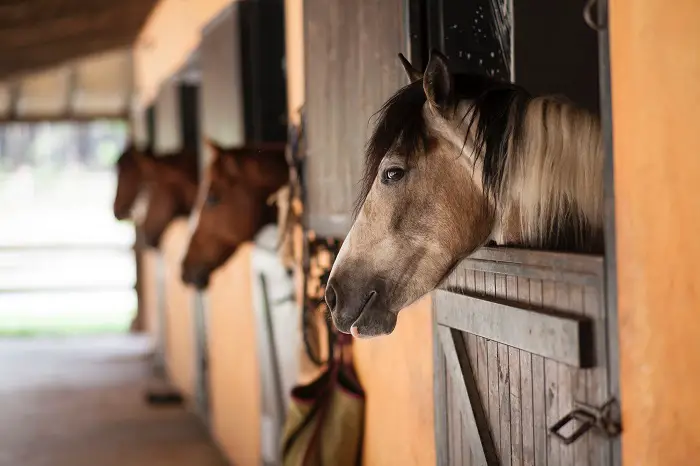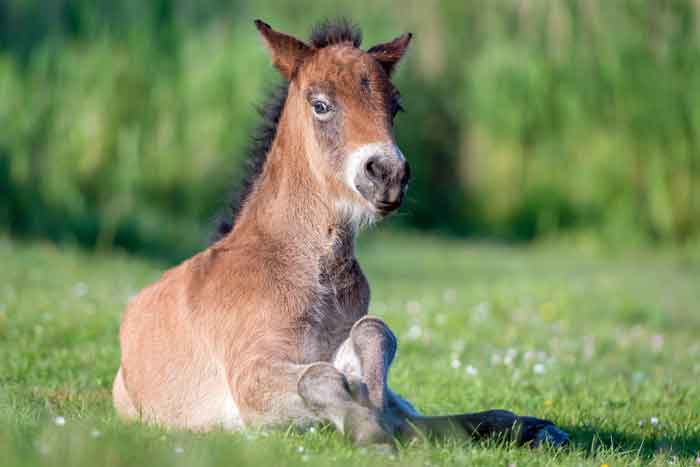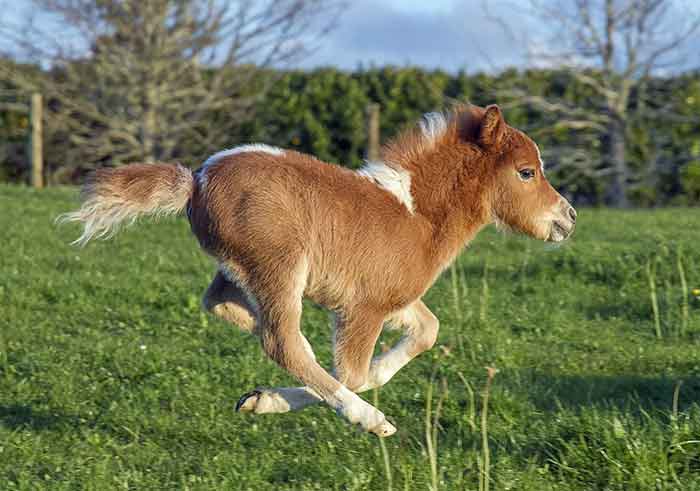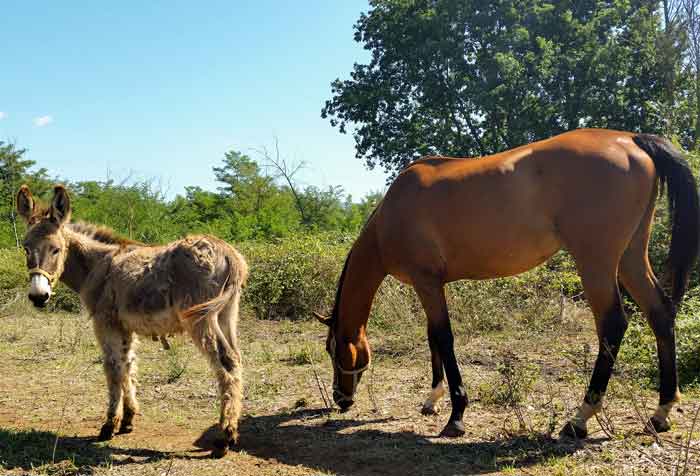Horses are very strong-willed and stubborn creatures, and if they don’t want to do something, it can be hard for you to convince them.
Some horses don’t want to enter the barn, and some horses don’t want to leave it.
Horses can also become difficult if they are being removed from other horses.

What Causes a Horse to be Barn Sour?
Horses become barn sour when they are more comfortable in the barn than they are out on the trail.
If you have a barn sour horse, it can be very difficult to get your horse into or out of their comfort zone.
Barn sour horses can refuse to either enter or leave their barns. They can also refuse to go out on their own without their fellow horses.
This is all due to what makes them comfortable and uncomfortable. Knowing what causes your horse to be uncomfortable can help you to figure out how to fix it for them.
Your horse’s uncomfortable feelings can be caused by a few different potential reasons.
Herd Mentality:
Before horses were domesticated, they were herd animals that relied on others for safety.
This means that they are generally more comfortable in the safety of their herd than they are out on their own.
In the wild, horses protected themselves from running away from predators or by using their numbers to their advantage. Horses are intimidating when they move in numbers and can be a deterrent to predators as well as naturally having a look-out.
For this reason, when you try to separate your horse from the others, even just to run out on the trail, you could be dealing with a horse that feels like he is leaving a safe environment.
Even after hundreds of years of domestication, horses still have a herd instinct.
Teaching your horse to respect your cues is one way to begin to train them to move away from the herd when you need them to.
Proper training will not only help your horse to better learn and follow your cues, but it is also a way for you to create a stronger relationship with your horse so that he also looks to you as a leader who can offer safety and protection.
Over Exertion:
One reason that your horse might not want to leave the barn is that they feel comfortable there, and they do not feel comfortable when they leave.
Over exerting your horse can make them feel uncomfortable to leave the barn because they know when they do, they might be overworked.
If a horse is constantly overworked, they will begin to realize that being ridden will always be too much work, and they would rather be in their barn where they are comfortable.
Improperly Returning to the Barn:
It’s not just overworking your horse that can make them uncomfortable being outside of the barn.
If you take them back to the barn in the wrong way, this can also make it so that your horse would rather be in the barn instead of out on the trail.
If you are always taking your horse back into the barn at higher speeds instead of a slow walk, your horse will get excited to rush back and rest.
This can teach your horse that they should be excited to be heading back instead of being out on the trails.
This might make them reluctant to leave the barn in the future.
How Do You Fix a Barn Sour Horse?
Knowing why your horse will not leave their barn, is the first step to trying to fix it.
However, just because you have determined the problem, doesn’t mean you don’t have a long way to go to fix it.
Fixing a barn sour horse is crucial because a horse that is barn sour can exhibit dangerous behaviors such as bucking or rearing when you try to take him out of the barn or racing back to the barn too quickly when it is time to head back.
Trail Companions:
The first tip when you are trying to fix a barn sour horse is to start by going out with the companionship of another horse – especially a horse that is not barn sour and behaves well out on the trails.
A fellow horse companion does not only act as a good influence and a distraction but also can help your horse feel secure by being in a group.
This also helps if your horse suffers from separation anxiety from its herd.
Short Duration Exercise:
When you do go out, you want to take your horse on short rides to start, so that they begin to enjoy their time outside the barn and look forward to going out in the future.
Slowly work the horse away from the barn and back multiple times to teach them the cues you plan to use in the future.
Walk your horse around the yard or barn a few times before putting him away, just so he is aware that you dictate the agenda.
Slow Return Home:
If your horse is the type to race back to the barn, then there is a different tactic you should consider.
If your horse starts to speed back home, you will want to turn them away and go in a different direction. This will stop the horse from being able to do what he wants.
You should do this with your horse until he relaxes, and then you can give him the reward of going back to the barn.
Having another horse around while you are working with this issue can also be beneficial.
Do All Horses Need a Barn?
You might not think so, but horses and ponies can live without a barn and be perfectly comfortable as long as they have some form of shelter.
Horses need protection from the elements, including sun, wind, and rain.
If you live somewhere that has harsh weather conditions, it is recommended that you keep them in a barn. Horses are great in the cold, but even they have a limit that they cannot go past.
Stables are also important to keep your horses clean, working with your horse, keeping them safe during sickness, or when they are giving birth to foals.
If you do not keep your horses in a barn, you will want to make sure that you at least build them an open structure with some walls to protect them.
Outside Time is Important:
Even if you do have a barn for your horses, you should try to keep them outside as often as possible.
Horses are built to be outside, and they should enjoy plenty of time outside.
Giving your horse time outside in a capacity that allows them rest and enjoyment will also help to make sure they do not become barn sour because they will feel more comfortable in other spaces than just their stall.
How Long Does it Take for a Horse to Adjust to a New Barn?
Horses have a hard time adjusting to new places because it can be difficult for them to understand what is happening, and they only have their instincts to rely on.
Horses can be nervous and jumpy in new places when they are surrounded by other horses that they do not know in a place that they do not recognize.
Every horse is different, and some will take moving without any issue, and some will not. When dealing with a horse who doesn’t deal well with moving to a new barn, the key is patience.
If the same thing was happening to you, and you didn’t understand what was going on, you would probably be uncomfortable too.
This could be especially difficult if you purchased a new horse, who doesn’t recognize you either.
Socialize:
To help your horse adjust, it is best to make sure they are not alone.
Making sure that your horse is stalled or pastured near other horses will help them feel more safe and secure even if they do not know the other horses.
Even if your horse becomes more relaxed in their new environment, you will not want to separate or isolate them, which can undo any progress made.
Smaller Areas:
Another trick when moving your horses to a new location is to keep them in a smaller area at first.
If you leave them in a large paddock and they are not familiar with you, you will spend a lot more time chasing after them than anything else, which could be stressful for both you and your new horse.
If you are trying to get a horse to trust you, you can always use snacks and treats as positive reinforcements.
Time:
Giving your horse time can be another good way to make sure they are comfortable.
Not riding your horse right away and allowing them to adjust to you and their surroundings can be incredibly helpful when trying to make them comfortable.
Excercise:
Make sure you burn your horse’s anxiety energy before you take your horse out for a real ride.
Riding them around the pen so that they burn their anxiety off can really help when it comes time to go out on the trail.
If you do not do this, you could not only be disappointed with your ride but also could get injured by your horse.
Even if your horse begins to behave well in the pen, they could be completely different once out on the trail, which is yet another new environment for them.
All in all, make sure when working with your horse, you are calm, patient, and understanding. Pay attention to what they need and work repetitively with them to teach them all the proper cues and make them feel safe and secure.






